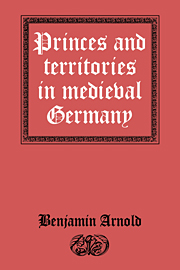Conclusion
Published online by Cambridge University Press: 03 December 2009
Summary
The distribution of medieval Germany into ecclesiastical, princely, and urban dominions was a work done so thoroughly that their autonomy was upheld until the Empire was swept aside by the might of the French Revolution and Napoleon. Although the western Roman emperor was respected as overlord and sovereign from 962 until 1806, his powers were not of a kind to convert the inherited drives of the princes and the Church away from regional and territorial autarky, let alone to subvert the resulting structure of independent principalities, bishoprics, and abbacies, with the urban states as an interstitial element. The nature of imperial authority and what it managed to achieve in the medieval centuries was quite misunderstood in later times when absolutist political ideals prevailed; hence the well-known aphorisms of Pufendorf and Voltaire on the Empire as a monstrosity, neither holy, nor Roman, nor an empire.
Political and territorial multiplicity as an outcome of aristocratic and ecclesiastical ambition in medieval Germany did in practice erode the conditions necessary for the imperial crown to become the governing institution actually effective throughout the provinces. But this was not the result of a conscious or intentional weakening of the crown. The German bishops and secular princes of medieval times admired strong kings and readily supported the military adventures of successive imperial dynasties. They subscribed to the regal Landfrieden and other internal measures and frequently voiced their approval of their emperors' efforts, by diplomacy and force, to regulate the affairs of Europe particularly in the religious sphere.
- Type
- Chapter
- Information
- Princes and Territories in Medieval Germany , pp. 280 - 284Publisher: Cambridge University PressPrint publication year: 1991



